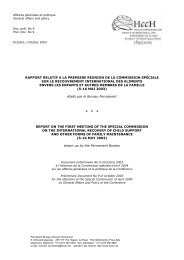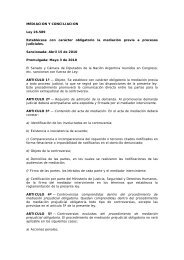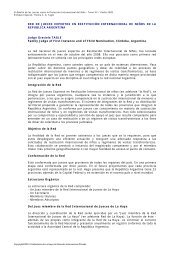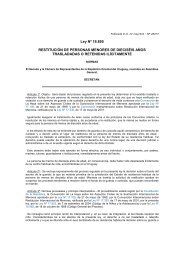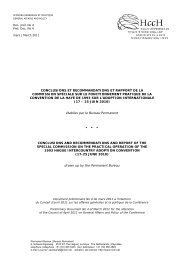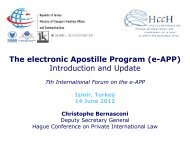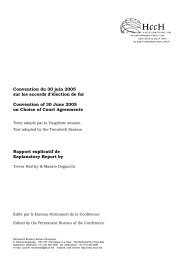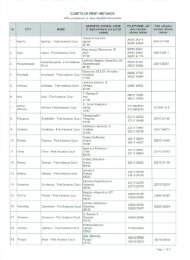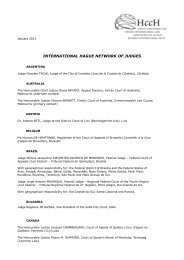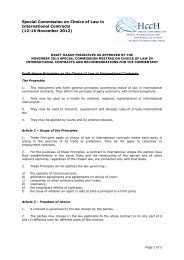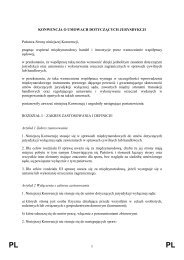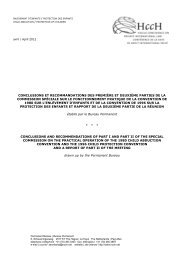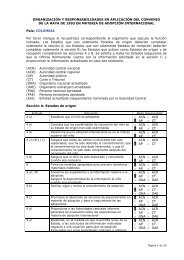Germany - HCCH
Germany - HCCH
Germany - HCCH
You also want an ePaper? Increase the reach of your titles
YUMPU automatically turns print PDFs into web optimized ePapers that Google loves.
ADOPTION<br />
Doc. prél. No 3 B<br />
Prel. Doc. No 3 B<br />
mars / March 2010<br />
PROFIL D’ÉTAT POUR L’ADOPTION INTERNATIONALE<br />
ÉTAT D’ACCUEIL<br />
établi par le Bureau Permanent<br />
* * *<br />
COUNTRY PROFILE FOR INTERCOUNTRY ADOPTION<br />
RECEIVING STATE<br />
drawn up by the Permanent Bureau<br />
Document préliminaire No 3 B de mars 2010 à l’intention de la<br />
Commission spéciale de juin 2010 sur le fonctionnement pratique de la<br />
Convention de La Haye du 29 mai 1993 sur la protection des enfants et<br />
la coopération en matière d'adoption internationale<br />
Preliminary Document No 3 B of March 2010 for the attention of the<br />
Special Commission of June 2010 on the practical operation of the<br />
Hague Convention of 29 May 1993 on Protection of Children and<br />
Co-operation in Respect of Intercountry Adoption<br />
Permanent Bureau | Bureau Permanent<br />
6, Scheveningseweg 2517 KT The Hague | La Haye The Netherlands | Pays-Bas<br />
telephone | téléphone +31 (0)70 363 3303 fax | télécopieur +31 (0)70 360 4867<br />
e-mail | courriel secretariat@hcch.net website | site internet http://www.hcch.net
PROFIL D’ÉTAT POUR L’ADOPTION INTERNATIONALE<br />
ÉTAT D’ACCUEIL<br />
établi par le Bureau Permanent<br />
* * *<br />
COUNTRY PROFILE FOR INTERCOUNTRY ADOPTION<br />
RECEIVING STATE<br />
drawn up by the Permanent Bureau
LAST UPDATED: 17-06-2010<br />
<strong>Germany</strong><br />
The Hague Convention of 29 May 1993 on Protection of Children and<br />
Co-operation in Respect of Intercountry Adoption:<br />
Date of ratification or accession:22 November 2001<br />
Objections to accession made by:<br />
Date of entry into force:1 March 2002<br />
Contact information of Central Authority:<br />
Name of office: Bundesamt für Justiz<br />
- Bundeszentralstelle für Auslandsadoption -<br />
Address: Adenauer Allee 99 - 103, 53113 Bonn<br />
Telephone: +49 (0)228 99 410 - 5414, 5415<br />
Fax: +49 (0)228 99 410 - 5402<br />
E-mail: auslandsadoption@bfj.bund.de<br />
Web site: www.bundesjustizamt.de<br />
Contact Person(s): Wolfgang Weitzel<br />
If your State has appointed more than one Central Authority, please provide contact<br />
information for each of these Central Authorities:<br />
Kommunalverband für Jugend und Soziales Baden-Württemberg<br />
Dezernat Jugend<br />
Zentrale Adoptionsstelle<br />
Lindenspürstr. 39<br />
70176 Stuttgart<br />
Tel.: +49 (711) 6375 - 0<br />
Fax: +49 (711) 6375 - 449<br />
E-Mail: zas@kvjs.de<br />
Internet: www.kvjs.de<br />
Zentrum Bayern Familie und Soziales<br />
Bayerisches Landesjugendamt<br />
Zentrale Adoptionsstelle<br />
Marsstr. 46<br />
80335 München<br />
Postfach 400260<br />
80702 München<br />
Tel.: +49 (89) 1261 - 04<br />
Fax: +49 (89) 1261 - 2280<br />
RECEIVING STATE<br />
COUNTRY PROFILE<br />
FOR INTERCOUNTRY ADOPTION<br />
Country Profile – Receiving Sate 3
E-Mail: poststelle@zbfs-blja.bayern.de<br />
Internet: www.blja.bayern.de<br />
Zentrale Adoptionsstelle der Länder Berlin und Brandenburg<br />
im Landesjugendamt des Landes Brandenburg<br />
Hans-Wittwer-Str. 6<br />
16321 Bernau<br />
Tel.: + 49 (3338) 701 - 828<br />
Fax: + 49 (3338) 701 - 863<br />
E-Mail: Gabriele.Adamczewski@lja.brandenburg.de<br />
Internet: www.Zentrale Adoptionsstelle Berlin-Brandenburg.de<br />
Landesamt für Gesundheit und Soziales Mecklenburg-Vorpommern<br />
Abteilung Jugend und Familie / Landesjugendamt<br />
Zentrale Adoptionsstelle<br />
Neustrelitzer Str. 120, Block D<br />
17033 Neubrandenburg<br />
Postfach 11 01 63<br />
17041 Neubrandenburg<br />
Tel.: +49 (395) 380 - 3320<br />
Fax: +49 (395) 380 - 3302<br />
E-Mail: Poststelle.Lja@Lagus.mv-regierung.de<br />
Internet: www.lagus.mv-regierung.de<br />
Gemeinsame Zentrale Adoptionsstelle der Länder Freie Hansestadt Bremen,<br />
Freie und Hansestadt Hamburg, Niedersachsen und Schleswig-Holstein - GZA -<br />
bei der Behörde für Soziales, Familie, Gesundheit und Verbraucherschutz<br />
der Freien und Hansestadt Hamburg -<br />
Südring 32<br />
22303 Hamburg<br />
Tel.: +49 (40) 428 63 - 5006<br />
Fax: +49 (40) 428 63 - 5188<br />
E-Mail: GZA@bsg.hamburg.de<br />
Internet: www.hamburg.de/gza<br />
Landschaftsverband Rheinland<br />
- Landesjugendamt -<br />
Kennedy-Ufer 2<br />
50663 Köln<br />
Tel.: +49 (221) 809 - 0<br />
Fax: +49 (221) 809 - 6252<br />
E-Mail: anke.muetzenich@lvr.de, detlef.happ-margotte@lvr.de<br />
Internet: www.lvr.de<br />
Landschaftsverband Westfalen-Lippe<br />
LWL-Landesjugendamt Westfalen<br />
Zentrale Adoptionsstelle<br />
Warendorfer Str. 27<br />
48145 Münster<br />
Tel.: +49 (251) 591 - 6585<br />
Fax: +49 (251) 591 - 6898<br />
E-Mail: ruth.schuerbuescher@lwl.org<br />
Internet: www.lwl.org/LWL/Jugend/Landesjugendamt<br />
Landesamt für Soziales, Jugend und Versorgung<br />
Gemeinsame Zentrale Adoptionsstelle Rheinland-Pfalz und Hessen<br />
- Landesjugendamt -<br />
Rheinallee 97 - 101<br />
Country Profile – Receiving Sate 4
55118 Mainz<br />
Postfach 29 64<br />
55019 Mainz<br />
Tel.: +49 (6131) 967 - 0<br />
Fax: +49 (6131) 967 - 320<br />
E-Mail: GZA@lsjv.rlp.de<br />
Internet: www.landesjugendamt.de<br />
Ministerium für Arbeit, Familie, Prävention, Soziales und Sport<br />
- Landesjugendamt –<br />
Zentrale Adoptionsstelle<br />
Franz-Josef-Röder-Str. 23<br />
66119 Saarbrücken<br />
Tel.: +49 (681) 501 – 2083 oder – 2084<br />
Fax: +49 (681) 501 – 3416<br />
E-Mail: r.hilpert@bildung.saarland.de oder d.doerr@bildung.saarland.de<br />
Internet: www.landesjugendamt.saarland.de<br />
Sächsisches Staatsministerium für Soziales<br />
Landesjugendamt<br />
SG4: Familienbildung, Hilfen zur Erziehung, Zentrale Adoptionsstelle<br />
Parkstr. 28<br />
09120 Chemnitz<br />
Tel.: +49 (371) 24081-184 oder 185<br />
Fax: +49 (351) 451 00 54 - 941 oder 945<br />
E-Mail: Zentrale.Adoptionsstelle@slfs.sms.sachsen.de<br />
Internet: www.slfs.sachsen.de/lja<br />
Landesverwaltungsamt<br />
Landesjugendamt<br />
Zentrale Adoptionsstelle<br />
Ernst-Kamieth-Str. 2<br />
06112 Halle<br />
Tel.: +49 (345) 514 - 0<br />
Fax: +49 (345) 514 - 1719<br />
E-Mail: ZAS@lvwa.sachsen-anhalt.de<br />
Internet: http://www.sachsen-anhalt.de<br />
Thüringer Ministerium für Soziales, Familie und Gesundheit<br />
Referat 35<br />
- Landesjugendamt -<br />
- Zentrale Adoptionsstelle Thüringen -<br />
Werner-Seelenbinder-Str. 6<br />
99096 Erfurt<br />
Postfach 90 03 54<br />
99106 Erfurt<br />
Tel.: +49 (361) 3798 - 375<br />
Fax.: +49 (361) 3798 - 830<br />
E-Mail: Brita.Fuchs@tmsfg.thueringen.de<br />
Internet: www.thueringen.de/de/tmsfg/familie/landesjugendamt<br />
1. ROLE OF AUTHORITIES AND BODIES IN ADOPTION<br />
1.1 Central Authority<br />
Describe briefly the functions of the Central Authority(ies) (e.g., see Arts 6-9; and<br />
Arts 14-21 if accredited bodies are not used).<br />
Country Profile – Receiving Sate 5
The Central Authority within the meaning of article 6 of the Hague Convention of 29<br />
May 1993 (Convention) are the Federal Office of Justice in its capacity as the<br />
Federal Central Office for International Adoption (Federal Central Office) and the<br />
central adoption offices of the regional youth welfare offices (central adoption<br />
office).<br />
The Federal Central Office performs the duties in keeping with article 6, section 2,<br />
sentence 2 of the Convention and co-ordinates the fulfilment of the duties in<br />
keeping with the articles 7 and 9 of the Convention with the international<br />
placement offices. The fulfilment of the tasks in keeping with article 8 of the<br />
Convention is co-ordinated with the central adoption offices.<br />
1.2 Public authorities and competent authorities<br />
Describe briefly the role of any public authorities and competent authorities<br />
including courts (e.g., see Arts 4, 5, 9 and 22).<br />
Federal Central Office and central adoption office: see 1.1<br />
Other state authorities within the meaning of articles 9 and 22, paragraph 1 of the<br />
Convention are the adoption placement offices of the youth welfare offices,<br />
provided the supervising central adoption office has issued a single case<br />
permission. The adoption placement offices perform the duties in keeping with<br />
articles 9 and 14 to 21 of the Convention for their placement cases.<br />
Other permitted organisations within the meaning of articles 9 and 22, paragraph 1<br />
of the Convention are the accredited bodies, provided they have been approved<br />
for international adoption placement relative to the countries party to the<br />
Convention (section 2a sub-section 3 No. 3, section 4 sub-section 2 of the<br />
German Adoption Placement Act). The accredited bodies perform the duties only<br />
with respect to the placement of a child with habitual residence outside <strong>Germany</strong><br />
for PAPs with habitual residence in <strong>Germany</strong>.<br />
1.3 Bodies / Persons involved in the adoption process<br />
a) Under Article 13 (national accredited bodies):<br />
i. If your State has accredited any adoption bodies, please indicate the<br />
number and describe their role.<br />
Currently, there are 14 national accredited bodies. They perform the duties<br />
in keeping with articles 9 and 14 to 21 of the Convention for their placement<br />
cases with respect to the placement of a child with habitual residence outside<br />
<strong>Germany</strong> for PAPs with habitual residence in <strong>Germany</strong>.<br />
ii. Are their details on the Hague Conference website and are they kept up to<br />
date?<br />
yes<br />
(see http://www.hcch.net/index_en.php?act=authorities.details&aid=179)<br />
b) Under Article 22(2) (approved (non-accredited) persons):<br />
i. If your State has approved any non-accredited persons, please indicate the<br />
number and describe their role.<br />
- / -<br />
ii. Are their details on the Hague Conference website and are they kept up to<br />
date?<br />
- / -<br />
1.4 Accreditation and authorisation<br />
Country Profile – Receiving Sate 6
Did your State complete the Questionnaire of 2009 on accredited bodies? If so,<br />
the Permanent Bureau will provide the link to your response on its website.<br />
yes<br />
1.4.1 Accreditation (Arts 10-11) 1<br />
a) What is the name of the authority / body responsible for accreditation of national<br />
adoption bodies?<br />
The central adoption offices of the regional youth welfare offices<br />
b) Describe briefly the process of accreditation and the most important<br />
accreditation criteria. Provide a link to more detailed information.<br />
The approval as accredited body can be gained, if the evidence is furnished that<br />
the office<br />
1. only entrusts specialists with adoption placements, who on account of their<br />
personality, their training and the professional experience are suitable,<br />
2. is staffed with at least two full-time specialists or a corresponding number of<br />
part-time specialists,<br />
3. can be expected to fulfil its tasks correctly in particular on account of its method<br />
of working and the financial position of its legal entity, and<br />
4. is operated by a legal entity or an association of persons which wishes to pursue<br />
tax-privileged purposes in compliance with sections 51 to 68 of the German<br />
Fiscal Code.<br />
In order to examine as to whether the pre-requisites continue to exist, the<br />
central adoption office of the regional youth welfare office shall be permitted to<br />
collect information on the work of the adoption placement office in general and in<br />
detail, on the personal and functional competence of its managers and staff<br />
members as well as on the legal and organisational conditions as well as the<br />
financial standing of their legal entity.<br />
For more detailed information:<br />
http://www.bundesjustizamt.de/nn_257850/SharedDocs/Publikationen/BZAA/<br />
AdVermiG__engl,templateId=raw,property=publicationFile.pdf/AdVermiG_engl.pdf<br />
1.4.2 Authorisation (Art. 12) 2<br />
a) What is the name of the authority / body responsible for authorisation of<br />
accredited bodies in your State to act in other Contracting States?<br />
- / -<br />
b) Is authorisation given as part of the accreditation process or is it a separate<br />
procedure?<br />
- / -<br />
c) Is the authorisation granted to work in all States of origin, some States or only<br />
one State?<br />
- / -<br />
d) Does your State use any criteria to decide on a request for authorisation?<br />
Provide a link to more detailed information.<br />
- / -<br />
1 “Accreditation” is the procedure to license adoption agencies according to the standards in the Convention<br />
so they may assist in arranging Convention adoptions. Adoption agencies with accreditation are “accredited<br />
bodies”.<br />
2 “Authorisation” is the procedure required by the Convention when an accredited body (usually in a receiving<br />
State) wishes to work in or with another country (the State of origin). Both States must give their<br />
authorisation.<br />
Country Profile – Receiving Sate 7
2. CHILDREN PROPOSED FOR ADOPTION IN THE STATE OF ORIGIN<br />
a) In your State, are there any conditions (by law or procedure) that affect the<br />
adoptability of a child from another State? Please specify<br />
-/-<br />
b) Describe what is meant by “children with special needs” in your State.<br />
There is neither a legal definition nor an official guideline for classifying a child<br />
with special needs. Common special needs conditions may be serious medical<br />
conditions, emotional and behavioral disorders, history of abuse or neglect,<br />
medical or genetic risk due to familial mental illness or parental substance<br />
abuse.<br />
3. PROSPECTIVE ADOPTIVE PARENTS (PAPS)<br />
3.1 Eligibility and suitability criteria for PAPs (Art. 5 a))<br />
3.1.1 Criteria of eligibility<br />
a) Profile of PAPs<br />
Married couple<br />
Unmarried couple or registered<br />
partnership<br />
Single person<br />
Same sex couple<br />
b) Age requirements<br />
Minimum age<br />
Maximum age<br />
Woman<br />
Man<br />
Yes If yes, are any conditions<br />
imposed? No.<br />
No If yes, are any conditions imposed<br />
(e.g., length of the relationship)?<br />
Yes If yes, are any conditions<br />
imposed? No.<br />
Yes If yes, are any conditions<br />
imposed? No.<br />
No If yes, are any conditions<br />
imposed?<br />
The adoptive parent must<br />
have reached the age of<br />
twenty-five.<br />
In case of a person who is<br />
not married adopting a<br />
child only alone the age of<br />
twenty-one is requiered.<br />
In case of a married couple<br />
a spouse must have<br />
reached the age of twentyfive<br />
and the other spouse<br />
the age of twenty-one.<br />
Yes / No Although the German<br />
Adoption Law provides no<br />
upper age limit for the<br />
adoption applicants,<br />
proceeding from the<br />
Country Profile – Receiving Sate 8
Difference (in years) required<br />
between the PAPs and the child:<br />
c) Other criteria<br />
Couple with children (biological or<br />
adopted)<br />
Infertility certificate Yes / No<br />
Other<br />
No<br />
If yes, specify<br />
3.1.2 Evaluation of PAPs<br />
principle that "the adoption<br />
shall be in the interest of<br />
upbringing and growth of<br />
the adopted minors", there<br />
shall be a reasonable age<br />
difference between the<br />
adopter and the adoptee.<br />
With this consideration in<br />
mind, the central adoption<br />
offices of the Land youth<br />
welfare offices recommend<br />
an age difference between<br />
the PAPs and the child of<br />
generally not more than 40<br />
years.<br />
No The age difference between<br />
child and PAPs should not<br />
be different from the<br />
average age difference of<br />
biological parents and their<br />
children. The central<br />
adoption offices of the Land<br />
youth welfare offices<br />
recommend an age<br />
difference between the<br />
PAPs and the child of<br />
generally not more than 40<br />
years.<br />
The adoption may not be<br />
pronounced if overriding<br />
interests of the children of<br />
the adoptive parent or of<br />
the child to be adopted<br />
prevent it or if it is to be<br />
feared that interests of the<br />
child to be adopted are<br />
endangered by children of<br />
the adoptive parent.<br />
The evaluation of PAPs is one part of the report on PAPs: see section 5.1<br />
a) Which body or expert performs the evaluation?<br />
The central adoption office, the youth welfare office or the accredited body<br />
Country Profile – Receiving Sate 9
) Describe briefly the evaluation procedure of PAPs.<br />
The respective adoption placement office (central adoption office, youthwelfare<br />
office with single case permission or accredited body) shall carry out relevant<br />
investigations on the PAPs' suitability to adopt a child from abroad in preparation<br />
of the adoption. Even if the central adoption office or an accredited body is<br />
responsible adoption placement office, upon request the local youth welfare<br />
office shall investigate the general suitability of the PAPs with their habitual<br />
residence in its area for the adoption of a child with habitual residence outside<br />
<strong>Germany</strong>. If the responsible adoption placement office considers the PAPs<br />
suitable in general, the said shall prepare a report on the results of the<br />
investigation, in which it expresses its views on the legal qualification and the<br />
suitability of the adoption applicants to take over the responsibility in conjunction<br />
with an international adoption as well as on the characteristic features of<br />
children, for which they are suitable to care.<br />
3.2 Preparation and counselling of PAPs (Art. 5 b))<br />
a) In your State, are courses given to prepare PAPs for international adoption?<br />
yes<br />
If yes,<br />
i. Are they mandatory?<br />
No, but strongly recommended by the central adoption offices of the<br />
regional youth welfare offices<br />
ii. At what stage(s) in the adoption process are they offered?<br />
At an very early stage<br />
iii. Who provides the courses?<br />
The accredited bodies, state authorities and private providers<br />
iv. Are they provided to PAPs collectively and / or individually?<br />
both<br />
v. For what period of time?<br />
weeks until months<br />
vi. What is their content?<br />
preparation and counsel<br />
vii. Are there any specific courses for PAPs wishing to adopt a child with<br />
special needs?<br />
yes<br />
b) What advice or counselling is available to individual PAPs? Who provides it and at<br />
which stage(s) in the adoption process is it provided?<br />
see a)<br />
4. PREPARATION OF THE ADOPTION FILE OF PAPS<br />
4.1 Submission of adoption request of PAPs<br />
a) To which authority / body are the adoption request and related documents<br />
submitted?<br />
The applicants with habitual residence within <strong>Germany</strong> shall direct their<br />
Country Profile – Receiving Sate 10
application either to the central adoption office of the regional Youth Welfare<br />
Office, to the youth welfare office competent in the district of which they<br />
habitually reside or to an accredited body. This decision is dependant on the<br />
State of Origin the PAPs desire to adopt from as well as their budget.<br />
b) Is it mandatory to submit the adoption request through an accredited body?<br />
no<br />
c) Who assists the PAPs if there is no accredited body involved?<br />
-/-<br />
4.2 Required documents in your State<br />
a) Please indicate whether the following documents are required:<br />
An application form for adoption completed by the PAPs<br />
A statement of “approval to adopt” issued by a competent authority<br />
Report on the PAPs including the “Home study” and other personal evaluations<br />
(Art. 15)<br />
Copies of passports of PAPs or other personal identification documents<br />
Copies of birth certificates of PAPs and of other children residing with them<br />
A copy of the marriage certificate (if married couple), divorce certificate (if<br />
either or both of the PAPs is divorced) or death certificate of the spouse (if one<br />
of the PAPs is widowed)<br />
Health certificates<br />
Evidence of the financial circumstances of the family<br />
Employment certificate<br />
Proof of no criminal record<br />
Please specify any other documents that are required:<br />
-/-<br />
b) If applicants apply through an accredited body, are the following documents<br />
required?<br />
Power of attorney issued by the family to the accredited body (e.g., a contract<br />
signed by an accredited body and the PAPs<br />
A document issued by a competent authority of your State and certifying that<br />
the accredited body may engage in intercountry adoption<br />
5. THE ADOPTION PROCEDURE<br />
5.1 Report on the PAPs (Arts 5 a) and 15)<br />
a) Who prepares the “home study” and other documents?<br />
See 3.1.2. b)<br />
b) For how long is the report valid? Who is responsible for renewing the report if the<br />
period of validity expires before the adoption is completed?<br />
The report is valid for 6 - 12 months. Responsible for renewing it are the same<br />
authorities as mentioned above.<br />
c) Who sends the PAPs request to the State of origin?<br />
Country Profile – Receiving Sate 11
After the responsible adoption placement office has convinced itself of the<br />
suitability of the PAPs, it shall forward the requested application documents<br />
inclusive of the report to the central authority of the state of origin. Upon<br />
request of the PAPs, the German Federal Central Office shall participate in the<br />
transmission of the requested documents.<br />
5.2 Matching and transmission of the report on the child (Art. 16(2))<br />
Who receives the report on the child referral and when are the PAPs informed?<br />
The responsible German adoption placement office acting as central authority<br />
should receive the chlid proposal b e f o r e the PAPs in order to give a first<br />
estimation on the matching. Unfortunately, some central authorities of States of<br />
origin do not observe this order.<br />
Before or after receipt of a child proposal, the German adoption placement office<br />
may enter into an exchange of opinions with the central authority of the state of<br />
origin.<br />
5.3 Acceptance of the match (Art. 17 a) and b))<br />
a) How much time is allowed for the PAPs to decide to accept the match?<br />
short time<br />
b) Is the match accepted if the profile of the child does not correspond to the one<br />
approved for those PAPs in the “home study”?<br />
No<br />
c) What are the conditions, if any, for approval by the Central Authority or other<br />
body of the proposed match?<br />
The child proposal of the central authority of the state of origin requires the<br />
approval by the German placement office acting as central authority, which shall<br />
have to make detailed examinations in particular of whether<br />
1. the adoption is in the best interest of the child and<br />
2. (a) the establishment of an adoption relationship is probable in <strong>Germany</strong> or<br />
(b) if the adoption is to be carried out in a foreign country, this will lead to a<br />
result which under consideration of the best interests of the child is evidently<br />
inconsistent with significant principles of German law, in particular with the<br />
fundamental rights.<br />
5.4 Agreement under Article 17 c)<br />
Which is the competent authority / body that must give agreement that the<br />
adoption may proceed?<br />
The responsible adoption placement office acting as central authority in this case<br />
(central adoption office, local youth welfare office with single case permission or<br />
accredited body)<br />
5.5 Travel of the PAPs to the State of origin<br />
a) Does your State impose any travel requirements or restrictions on PAPs in<br />
addition to those imposed by the State of origin? Please specify.<br />
no<br />
b) In what circumstances is an escort permitted to get the child from the State of<br />
Country Profile – Receiving Sate 12
origin?<br />
This is a case-by-case decision depending on whether the escort is ordered by<br />
the competent authorities in the state of origin or the receiving state.<br />
5.6 Authorisation to enter and reside permanently (Arts 5 c) and 18)<br />
Specify the procedure to obtain authorisation for the child to enter and reside<br />
permanently in your State.<br />
For the purpose of the establishment and preservation of a familial<br />
community between the PAPs and the child to be adopted,<br />
the entry and residence p r i o r to the execution of the adoption shall be<br />
based on the regulations on the right of entry of children as stipulated in<br />
the German Residence Act (Aufenthaltsgesetz) as soon as<br />
1. the international placement organisation has approved the child<br />
proposal of the central authority of the state of origin and<br />
2. the adoption applicants have consented to the child proposal.<br />
If the adoption has been pronounced in the state of origin before the child applies<br />
for immigration to <strong>Germany</strong>, the certificate of conformity is generally sufficient<br />
for the issuance of passport or visa (dependant of the adoption's effects). If no<br />
certificate of conformity can be submitted, the German Mission or other<br />
competent German office has to estimate if the adoption decision can be<br />
recognised under German Law (respect of ordre public/fundamental rights).<br />
5.7 Arrival of the child<br />
Once the child has arrived in your State, what is the procedure, if any, to notify the<br />
Central Authority or accredited body of the arrival?<br />
The Central Authority is permanently involved so that a notification is not necessary<br />
5.8 Certificate under Article 23<br />
a) What is the competent authority for issuing the certificate under Article 23 in<br />
cases where the adoption order / decree is issued in your State?<br />
If a central adoption office of the regional youth welfare office gives its consent<br />
in compliance with article 17, letter c of the Convention, the said shall issue the<br />
certificate in compliance with article 23 or article 27, section 2 of the Convention<br />
upon request of a body with a legal interest. If a youth welfare office or an<br />
accredited body has given its consent, the central adoption office of the regional<br />
youth welfare office shall be responsible, in the district of which the youth<br />
welfare office is located or in the district of which the accredited body is based.<br />
b) Have the details of the competent authority been sent to the Convention’s<br />
depositary 3 (as required by Art. 23(2)) or to the Permanent Bureau?<br />
yes<br />
c) Does your State use the “Recommended model form – Certificate of conformity<br />
of intercountry adoption” (see Guide to Good Practice No 1 - Annex 7, available<br />
on Hague Conference website)?<br />
yes<br />
d) Describe the procedure for issuing the certificate. For example, is a copy given<br />
automatically to the PAPs? Is a copy sent to the Central Authority of the State of<br />
origin? How long does it take to issue the certificate?<br />
3<br />
The depositary of the Convention is the Ministry of Foreign Affairs of the Kingdom of the Netherlands<br />
(Art. 43(2)).<br />
Country Profile – Receiving Sate 13
There is no special procedure.<br />
e) In cases where the certificate is issued in the State of origin, which authority or<br />
body in your State receives a copy of the certificate?<br />
It depends on the State of origin. Principally, the responsible German adoption<br />
office acting as central authority shall also receive a copy of the Certificate.<br />
6. ADOPTION OF A RELATIVE CHILD (INTRA-FAMILY ADOPTION)<br />
a) Explain what is meant by “relative child” in your State.<br />
A child which is in a legal relationship to one of the PAPs, for instance a niece or<br />
nephew<br />
b) In what circumstances does your State allow the adoption of a child, who is<br />
habitually resident in another State, by relatives of that child who are habitually<br />
resident in your State?<br />
No special regulations exist in the national adoption law; The Hague Adoption<br />
Convention is fully applicable.<br />
c) Does your State apply Convention procedures to such adoptions? Are there<br />
measures to expedite such adoptions?<br />
Yes, the HAC is applied to such adoptions; there are no specific<br />
measures to expedite them.<br />
7. POST-ADOPTION MATTERS<br />
7.1 Post-adoption reports<br />
a) Who is responsible for making the reports?<br />
The adoption placement office<br />
b) Who is required to send them to the States of origin?<br />
Provided it is needed to fulfil the adoption requirements set by a foreign country,<br />
the adoptive parents have to send them to the State of origin but they and the<br />
adoption placement office may agree in writing that the said reports to the<br />
competent office in the corresponding country.<br />
c) If the reports are forwarded by the accredited bodies or adoptive parents, is<br />
there any monitoring to ensure the reports are sent? Does the Central Authority<br />
have a role to play?<br />
Only by the state of origin. The German Federal Central Office is not involved in<br />
processing. If the state of origin asks for post-adoption reports at the Federal<br />
Central Office it will contact the responsible adoption placement office and/or the<br />
adoptive parents.<br />
7.2. Post-adoption services (Art. 9 c))<br />
a) Describe the post-adoption services, if any, that are provided in your State, and<br />
who provides them.<br />
In conjunction with the placement and the adoption, the adoption placement<br />
office, with the approval of the adopting party, shall consult the child and his/her<br />
parents in detail, in particular before the child is given in care and during the<br />
familiarisation period.<br />
Country Profile – Receiving Sate 14
) What, if any, assistance is given to adopted persons to search for their origins?<br />
The adopted persons' search for their origins is supported by the adoption<br />
placement offices. They provide the necessary information concerning the child's<br />
origin, the identity of his or her biological parents. They also advice on the<br />
adopted person's rights, assist with making desired enquiries, help to initiate and<br />
support contacts to the biological parents or other biological relatives.<br />
7.3 Preservation and availability of information (Art. 30)<br />
a) Which authority is responsible for preserving the information concerning the<br />
child’s origins (Art. 30(1))?<br />
The adoption placement office<br />
b) What are the legal requirements for preservation of information (e.g., duration,<br />
location)?<br />
Records and documents on each individual case of placement (placement files)<br />
shall be kept for sixty years reckoned from the date of birth of the child. If the<br />
adoption placement office is given up, the placement files shall have to be<br />
handed over for safekeeping to the office which takes over the tasks or to the<br />
central adoption office of the Land youth welfare office, in the area of which the<br />
adoption placement office had its headquarters. After the expiry of the period of<br />
time mentioned in sentence 1 the placement files shall have to be destroyed.<br />
c) In your State, does the law permit the adopted person to have access to this<br />
information? If yes, is there any age or other restriction?<br />
If the placement files deal with the descent and life history of the child or if there<br />
is a justified interest otherwise, the legal representative of the child, and if the<br />
child has reached the age of sixteen, he or she shall be given permission upon<br />
request to inspect the documents under guidance by a specialist. The inspection<br />
shall be refused, if overriding matters of a concerned person are in opposition.<br />
d) Are the biological parents or the adoptive parents permitted to have access to<br />
information about the adoption (see Art. 9 a) and c))?<br />
adoptive parents yes (see 7.3. b); biological parents no.<br />
e) What, if any, assistance does the Central Authority or another body give to the<br />
adopted person or the biological or adoptive parents to obtain access to that<br />
information?<br />
see 7.3. b)<br />
8. COSTS OF INTERCOUNTRY ADOPTION<br />
a) Are adoption costs or fees controlled by law and / or regulated by a public<br />
authority in your State? If yes, please provide a link to this information.<br />
§ 5 AdVermiStAnKoV (no english translation available):<br />
Führen staatliche Adoptionsvermittlungsstellen das<br />
Adoptionsvermittlungsverfahren durch, sind folgende Gebühren zu erheben:<br />
1. für die Durchführung eines internationalen Adoptionsvermittlungsverfahrens<br />
Country Profile – Receiving Sate 15
einschließlich der Eignungsprüfung nach § 7 Abs. 3 Satz 1 des<br />
Adoptionsvermittlungsgesetzes 2 000 Euro,<br />
2. für eine Eignungsprüfung nach § 7 Abs. 3 Satz 1 des<br />
Adoptionsvermittlungsgesetzes 1 200 Euro,<br />
3. für die Durchführung eines internationalen Adoptionsvermittlungsverfahrens<br />
ohne Eignungsprüfung nach § 7 Abs. 3 Satz 1 des<br />
Adoptionsvermittlungsgesetzes 800 Euro.<br />
http://www.gesetze-im-internet.de/advermistankov/__5.html<br />
b) What is the normal range of costs for an adoption (i.e., the minimum to the<br />
maximum cost)?<br />
depends on the single case and state of origin, no general information available<br />
c) Is there a standard or fixed fee charged by the Central Authority or accredited<br />
body for the adoption procedure? How much is this fee?<br />
see above b)<br />
d) What services or activities in your State are included in this cost?<br />
see above b)<br />
e) Other costs: Please complete the Table of Costs at Annex 1. 4<br />
9. IMPROPER FINANCIAL GAIN (ARTS 8 AND 32)<br />
a) Which authority is responsible for preventing improper financial gain?<br />
The public prosecutor<br />
b) What measures are taken to prevent improper financial gain?<br />
§§ 235, 236 StGB (German Criminal Code)<br />
c) Have there been any prosecutions for improper financial gain related to<br />
adoption? If so, were the prosecutions successful?<br />
yes<br />
10. NATIONAL LEGISLATION<br />
Identify the legislation in your State on international adoption and provide (if<br />
available) an electronic link to the text of the legislation.<br />
Act on the Implementation of the Hague Convention of 29 May 1993 on the<br />
Protection of Children and the Co-operation in the Field of International Adoption<br />
(Adoption Convention Implementation Statute – AdÜbAG)<br />
Act on the Adoption Placement and the Ban on the Arrangement of Surrogate<br />
Mothers (Adoption Placement Act – AdVermiG)<br />
Act on the Effects of the Adoption According to Foreign Law<br />
(Act on the Effects of the Adoption – AdWirkG)]<br />
www.bundesjustizamt.de<br />
11. OTHER HAGUE CONVENTIONS<br />
11.1 Legalisation / authentication<br />
4<br />
The Table of Costs is taken from the Guide to Good Practice No 2: Accreditation and Accredited Bodies,<br />
Chapter 8.<br />
Country Profile – Receiving Sate 16
a) Which documents need to be legalised?<br />
All documents necessary for the recognition of adoption<br />
b) Is your State a party to the Hague Convention of 5 October 1961 Abolishing the<br />
Requirement of Legalisation for Foreign Public Documents (Hague Apostille<br />
Convention)?<br />
Yes<br />
11.2 International foster care or kafala<br />
If your State is involved in international foster care placements or placements by<br />
kafala, the Hague Convention of 19 October 1996 on Jurisdiction, Applicable Law,<br />
Recognition, Enforcement and Co-operation in Respect of Parental Responsibility<br />
and Measures for the Protection of Children may be used. Is your State a party to<br />
this Convention?<br />
Not yet<br />
12. OTHER QUESTIONS<br />
a) National adoptions:<br />
� How many children are in institutions in your State?<br />
no information<br />
� How many are adoptable?<br />
no information<br />
� How many are adopted per year?<br />
no exact information<br />
b) Does your State permit the adoption of children from non-Hague Convention<br />
States?<br />
yes<br />
c) Statistics:<br />
� Does your State collect statistical data relating to adoption (national or<br />
international)?<br />
yes, but only statistical data of adoptions which are attended by an adoption<br />
placement office; private/independent adoptions are not reported to a data<br />
collecting office<br />
� Are your statistics on a publicly available website? If yes, please provide the<br />
link. If not, how can you provide access to your statistics?<br />
https://www-ec.destatis.de (but see restriction above)<br />
� Please complete the “Annual adoption statistics for receiving States” form<br />
(Prel. Doc. No 5) for the last five years. In the future, States will be asked to<br />
complete this form on an annual basis.<br />
not possible<br />
Country Profile – Receiving Sate 17
13. USEFUL ELECTRONIC LINKS<br />
Provide electronic links to important and useful information about adoption and<br />
intercountry adoption in your State.<br />
www.bundesjustizamt.de<br />
Country Profile – Receiving Sate 18
Annex 1<br />
Receiving States’ costs in the field of intercountry adoption<br />
Please provide details of following:<br />
1. Expenses incurred in the receiving State<br />
These expenses consist of administrative costs such as membership fees, registration<br />
fees, administration and co-ordination fees, legal costs, psychosocial evaluation costs<br />
(the home study report), the costs of the various immigration procedures and<br />
certificates.<br />
They may include:<br />
(a) charges intended for the accredited body, such as:<br />
fees for membership of the body;<br />
fees for opening of the adoption case file;<br />
programme-development charges;<br />
administration and co-ordination costs;<br />
communication costs;<br />
cost of translation of PAPs’ case file.<br />
(b) charges intended for third parties, such as:<br />
cost of certification of the case file and legal fees;<br />
cost of preparation for the psychosocial evaluation;<br />
notary’s fees;<br />
cost of legalisation of documents;<br />
immigration costs;<br />
costs of obtaining certificates (medical, birth, marriage, criminal record);<br />
costs of obtaining passports;<br />
costs for the psychosocial evaluation.<br />
2. Expenses incurred in the State of origin<br />
This category includes all the expenses incurred in the State of origin except the PAPs’<br />
accommodation and transport costs. Please indicate which costs are paid in your State:<br />
administration and co-ordination costs;<br />
legal costs (notary, lawyer, court and motion costs);<br />
doctor’s fees for the child’s medical record;<br />
translation costs;<br />
costs of the child’s maintenance;<br />
costs for updating of records.<br />
Other costs:<br />
please specify.<br />
3. Travel costs<br />
These expenses are connected with the PAPs’ travel in the State of origin.<br />
These costs include:<br />
return air fare;<br />
accommodation costs: hotel and meals;<br />
single fare for the child;<br />
guide’s and interpreter’s costs, if appropriate;<br />
travel costs within the State.<br />
Country Profile – Receiving Sate 19
4. Contributions to humanitarian aid projects or donations<br />
Contribution may be made for humanitarian-aid projects and / or donations to<br />
orphanages or other public or private institutions connected with child protection.<br />
They may also be imposed by the accredited bodies themselves.<br />
Mandatory contribution to government / Central Authority<br />
Mandatory contribution to child welfare home / public or private institution<br />
Other contribution:<br />
please specify;<br />
Donation<br />
5. Post-adoption expenses<br />
This category concerns all expenses required to finalise an adoption case and those<br />
incurred once the adoption has been completed. The costs to be borne include:<br />
for non-convention adoptions, a motion for recognition of judgments or rulings; 5<br />
stamps for the motion for non-convention adoptions;<br />
translation of the judgment or ruling by the State of origin;<br />
reports on the child’s development;<br />
translation of development reports;<br />
certification of reports and transmission to the State of origin<br />
5<br />
No additional procedure for recognition of an adoption decision is required for Hague Convention adoptions.<br />
Recognition is automatic, as provided in Art. 23.<br />
Country Profile – Receiving Sate 20



